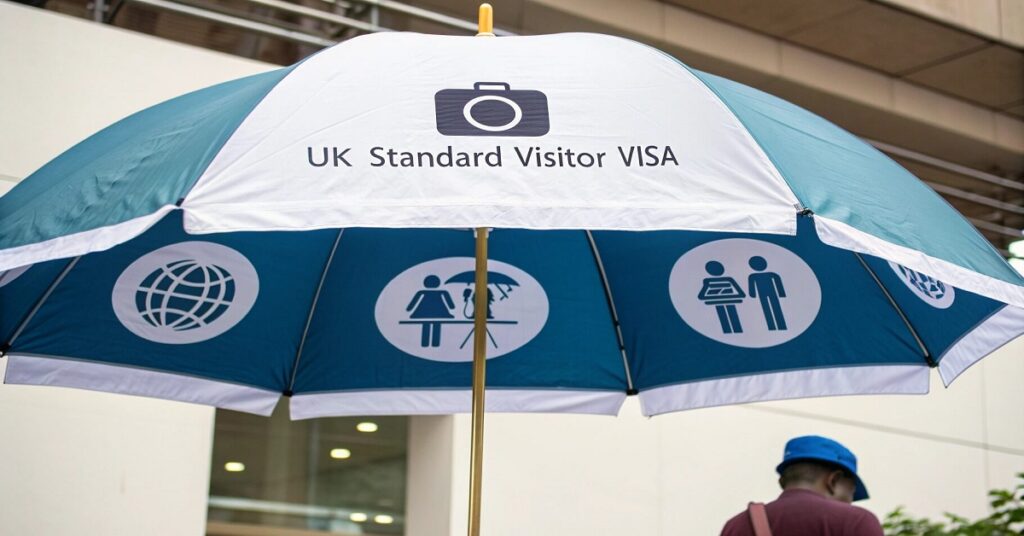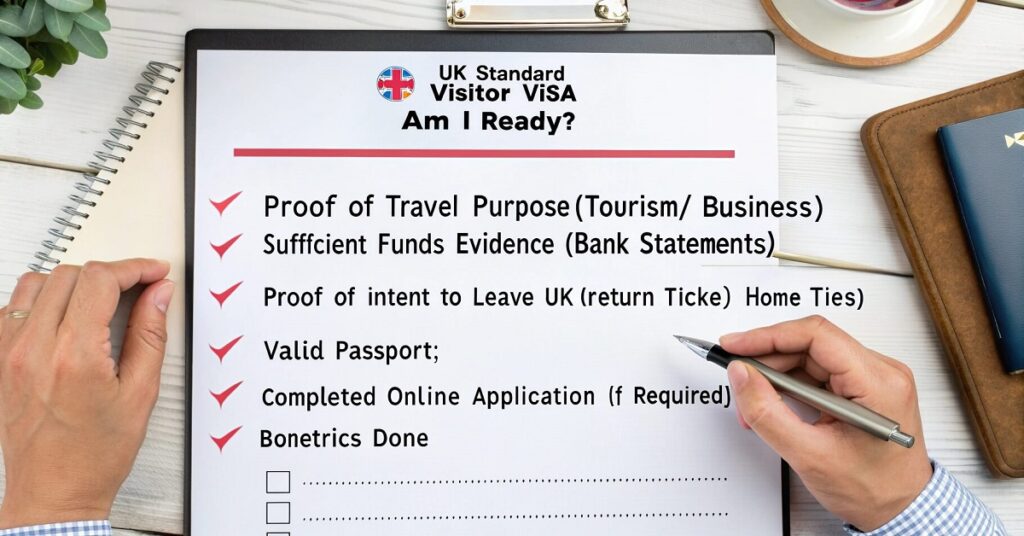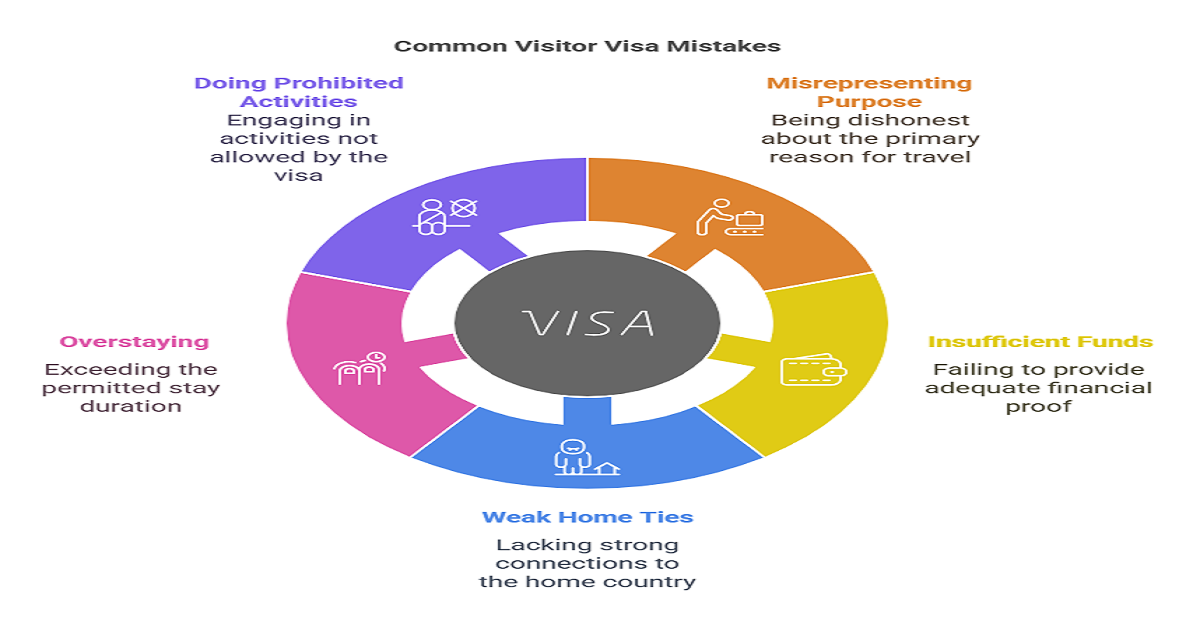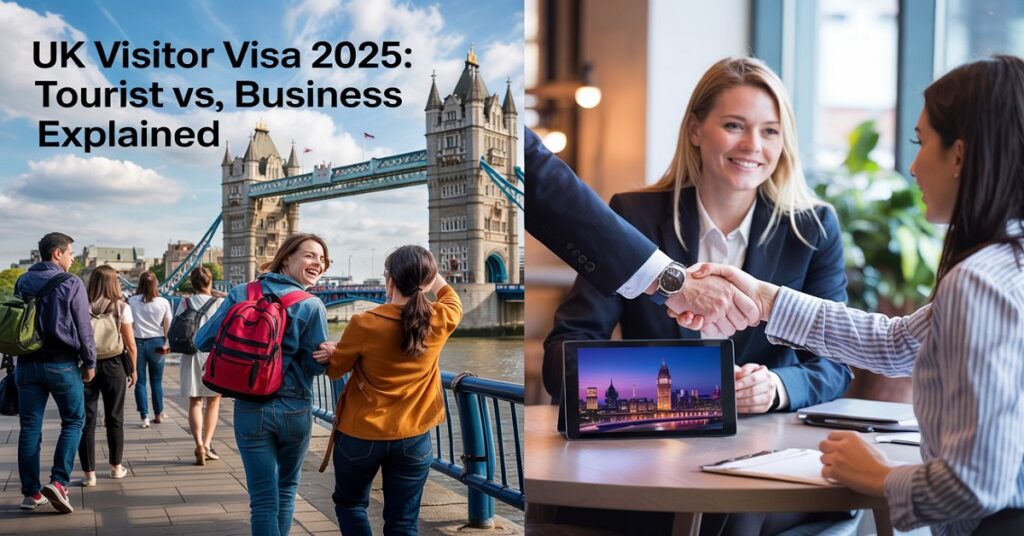Planning a trip to the UK in 2025? Whether it’s for a holiday, visiting family, attending meetings, or exploring business opportunities, understanding the visa requirements is key. You might be wondering about the difference between a ‘Tourist’ and ‘Business’ visa. Let’s simplify: for most short trips, you’ll use the single UK Standard Visitor visa. The crucial difference isn’t the visa itself, but your visit’s primary purpose and the specific activities permitted under that reason.
This guide, fully updated for 2025, breaks down the UK Standard Visitor visa. We’ll explain the vital distinction based on permitted activities for tourist vs. business visits, detail eligibility, walk you through applying (if needed), offer practical tips, and answer frequently asked questions. Our information is drawn directly from official UK government sources (gov.uk) to provide authoritative, people-first guidance, helping you navigate your UK visit with confidence.
Table of Contents
What is the UK Standard Visitor Visa?
The old system of separate short-term tourist and business visas is gone. The UK simplified entry with one main category for short stays.
The Standard Visitor visa is the UK’s entry route for individuals travelling for short periods (typically up to 6 months per visit) for various purposes, including:
- Tourism, holidays, and sightseeing.
- Visiting family or friends.
- Specific permitted business activities (like meetings or conferences, not employment).
- Other reasons like short recreational courses (under 30 days) or private medical treatment.
This single visa consolidated previous categories, creating one primary pathway for most temporary visitors.
This visa consolidated previous categories, creating one primary pathway for most visitors.
- Authoritative Source: This information aligns with the UK government’s official guidance.
Why This Single Visa Matters

This consolidation means your focus shifts from choosing a visa type to clearly defining and proving your visit’s main purpose (tourism or business) and ensuring your planned activities are allowed under that banner when you apply for the Standard Visitor visa.
Tourist vs. Business Purpose: It’s All About Permitted Activities
Since it’s the same visa, the practical difference lies entirely in what you are permitted to do while in the UK. Honesty about your primary purpose during the application is essential. You can find the specific rules for permitted activities in the Immigration Rules Appendix V: Visitor.
Permitted Tourist Activities
If visiting primarily for leisure or personal reasons, allowed activities include:
- Vacationing, holidays, sightseeing.
- Visiting family and friends.
- Short recreational courses (under 30 days, e.g., language course).
- Receiving private medical treatment (specific evidence needed).
- Real-world Example: Travelling for three weeks to explore Scotland’s Highlands and visit university friends in Edinburgh.
- Source Ref: Activities outlined on gov.uk align with Appendix V.
Permitted Business Activities
For visits with specific business objectives, the Standard Visitor visa permits:
- Attending meetings, conferences, and seminars.
- Negotiating and signing deals/contracts.
- Conducting site visits, inspections.
- Gathering information for overseas employment.
- Receiving brief, role-specific training (if unavailable in the home country).
- Undertaking specific Permitted Paid Engagements (PPE) by invitation (e.g., guest lecture, performance – strict rules apply).
- Real-world Example: Flying to London for one week to attend an industry expo, participate in prearranged meetings with suppliers, and give a presentation at the expo (if invited formally, potentially qualifying as PPE).
- Expert Tip: For business visits, always carry evidence like invitation letters, meeting agendas, or conference registration to validate your purpose if questioned by Border Force.
- Source Ref: Business activities defined on gov.uk align with Appendix V.
| Feature | Tourist Purpose Explained | Business Purpose Explained |
| Primary Goal | Leisure, holidays, visiting family/friends. | Specific business goals: meetings, deals, conferences, etc. |
| Visa Category | Standard Visitor Visa | Standard Visitor Visa |
| Permitted Example | Exploring historical sites, relaxing. | Attending scheduled client meetings, negotiating contracts. |
| Key Limitation | Cannot undertake the business tasks listed opposite. | Cannot take UK employment or run a business from the UK. |
| Typical Evidence | Flight bookings, hotel reservations, and tour plans. | Company invitation letter, meeting schedule, conference pass. |
Crucial: What You CANNOT Do on a Standard Visitor Visa
Violating these rules can lead to visa cancellation, removal, and future entry bans. Regardless of purpose, you cannot:
- Take employment (paid/unpaid) for a UK company or as self-employed. (Directly answers: Can I work in the UK with a tourist visa?) Limited PPE exceptions don’t cover regular jobs.
- Live in the UK long-term via frequent visits.
- Start, register, or run a business in the UK. Requires an entrepreneur visa. (Directly answers: Can I start a business in the UK on a visit visa?)
- Actively look for work. (Directly answers: Can you look for a job while on a visitor visa in the UK?)
- Access public funds (benefits).
- Study long-term (needs a student visa).
- Marry/form a civil partnership (needs a Marriage Visitor visa or settlement route). (Related to: Can I convert a UK tourist visa to a work permit?) ? – No, the UK typically disallows switching.
Checking Your Eligibility: Can You Get a Standard Visitor Visa?
Meeting eligibility criteria is mandatory. You must convince UK Visas and Immigration (UKVI).
Core Eligibility Requirements
You must demonstrate:
- Genuine intention to leave the UK after your visit (e.g., return flight, job/family ties at home).
- Sufficient funds for your entire trip (travel, accommodation, living costs) without working or needing public benefits. (Related to: How much money is required for a UK business visa?) Proofs like bank statements showing stable finances are essential. Check gov.uk financial guidance.
- Ability to pay for your return/onward journey.
- Your visit purpose aligns with permitted activities.
- You won’t use the visa for de facto residence.

Eligibility Specific to Business Visits
While core criteria are the same; business visitors need stronger evidence linking to their purpose: invitation letters, conference passes, and employment letters confirming overseas role and purpose of UK visit.
Application Need: Visa National vs. Non-Visa National
- Visa Nationals: Must apply online for the visa before travelling.
- Non-Visa Nationals (e.g., USA, EU, Canada, Aus/NZ): rarely need to apply beforehand for visits up to 6 months; seek entry on arrival.
- ETA Scheme: Expanding requirement for many non-visa nationals (e.g., Gulf states, Jordan). Must apply online for Electronic Travel Authorisation (£10 fee as of April 2025) before travel.
- Crucial Action: Always verify requirements for YOUR nationality using the official tool:
- Check ETA Needs
How to Apply for the UK Standard Visitor Visa (If Required)
If you’re a visa national, follow these steps:
The Application Journey
- Start: Access Official Gov.uk Portal
- Complete Online Form: Provide accurate details
- Pay Correct Fee: Check current fees
- Book Biometrics: Find nearest VAC
- Attend Appointment: Photo & fingerprints taken
- Upload ALL Supporting Docs: Passport, finances, purpose proof
- Wait for Decision: Check processing times
- Outcome: Visa Issued/Refused.
Only use the official gov.uk portal. Avoid unofficial sites promising faster/easier visas; they often charge extra or give terrible advice.
What If Your UK Visitor Visa is Refused?
A visa refusal can be disheartening. Understanding potential reasons and options is important.
Common Reasons for Refusal
- Insufficient evidence of funds.
- Not convincing the Entry Clearance Officer (ECO) of your intent to leave the UK (weak ties to your home country).
- Previous adverse immigration history (overstaying, breaches).
- Credibility doubts regarding the stated purpose of the visit.
- Failure to provide requested documentation correctly.
What Are Your Options After Refusal?
- Review the Refusal Notice: Understand the exact reasons given by the ECO.
- Reapply: If you address the issues (e.g., by providing better financial evidence), submit a new application directly countering the reasons for the previous refusal. There is no limit on reapplications, but each costs the application fee.
- Administrative Review (Limited Cases): In very specific circumstances (usually related to simple case working errors, not disagreement with the judgment), there might be a right to Administrative Review. This is uncommon for visitor visas.
- Seek Professional Advice: If unsure, consult a qualified immigration advisor or solicitor to understand your options based on the specific refusal grounds.
UK Visitor Visa Application Checklist
Being prepared is key. While specific requirements vary, here’s a general checklist:
(Core Documents):
- Valid Passport or Travel Document.
- Completed online application form (printout/confirmation if applicable).
- Biometric Appointment Confirmation (if applicable).
- Visa Fee Payment Confirmation.
(Proof of Purpose):
- Tourist: Flight / Train Bookings (entry & exit), Hotel Reservations / Accommodation Proof, Rough Itinerary / Tour Bookings (optional but helpful).
- Business: Invitation Letter from UK entity, Conference Registration / Tickets, Meeting Agendas / Schedules, Letter from Overseas Employer detailing purpose/role.
- Visiting Family/Friends: Invitation Letter from host, Proof of host’s UK status (e.g., passport copy, visa).
(Financial Evidence):
- Recent Bank Statements (e.g., 6 months showing income/savings).
- Payslips / Proof of Income.
- Letter from Employer (confirming employment, salary, leave approval).
- Self-Employed: Business registration, accounts, tax returns.
- Evidence of funds from sponsor (if applicable, with sponsor’s documents).
(Proof of Intent to Leave / Ties to Home Country – If needed):
- Property Ownership / Tenancy Agreement.
- A letter from the Employer confirming the return to the job.
- Evidence of Family Dependents remaining home.
- Enrollment in Education back home.
FAQs About the UK Visitor Visa in 2025
What is the difference between a business visa and a tourist visa in the UK?
There’s no difference in the visa type for brief stays; both usually fall under the Standard Visitor visa. The key difference is your declared main purpose and the specific permitted activities associated with either tourism (leisure, family visits) or business (meetings, conferences, contract negotiations).
Can I work in the UK on a tourist visa?
No. The Standard Visitor visa (whether used for tourism or business) strictly prohibits taking paid or unpaid employment for a UK company or being self-employed. Limited exceptions for ‘Permitted Paid Engagements’ exist but don’t cover regular work.
Can I start a business in the UK on a visit visa?
No. Starting, registering, or running a business requires a specific entrepreneur or innovator visa route (like the Innovator Founder visa), not the Standard Visitor visa. Business activities permitted are limited (e.g., meetings, negotiations).
Can you look for a job while on a visitor visa in the UK?
No. Actively seeking employment is not permitted on a Standard Visitor visa. While attending a prearranged job interview might fall under permitted business activities, general job hunting is forbidden.
Can I convert a UK tourist visa to a work permit?
Typically, no. You usually cannot switch from a Standard Visitor visa to a work visa (like the Skilled Worker visa) from within the UK. You must apply for the appropriate work visa from your home country or country of residence.
How long can you stay in the UK on a tourist visa?
Using the Standard Visitor visa for tourism, the maximum stay per single visit is usually up to 6 months. Even if you hold a longer-term visa (valid for 2, 5, or 10 years), each visit cannot exceed this 6-month limit.
How much money is required for a UK business visa?
There isn’t a fixed amount. You need sufficient funds to cover all reasonable costs of your visit (travel, accommodation, living expenses) without working or needing public funds. Evidence like bank statements showing regular income and adequate savings is key. The required amount depends on your trip’s length and nature.
Which UK visa is easiest to get?
“Easiest” depends heavily on meeting the specific criteria. The Standard Visitor visa can be straightforward if you meet all eligibility requirements (funds, intent to leave, permitted purpose). However, no visa is guaranteed; thorough preparation is vital for any application.
Which is the most difficult visa to get?
Stricter requirements and documentation make visas with high investment thresholds, complex business plan requirements (Innovator Founder), specific skill needs (some Skilled Worker routes), or extensive relationship evidence (some Family visas) more challenging or complex than the Standard Visitor visa.
Top 5 Common Visitor Visa Mistakes (And How to Avoid Them)

- Misrepresenting Purpose: Declaring tourism but primarily doing business (or vice versa).
- Avoid: Be 100% honest about your main reason. Carry documents supporting that reason (e.g., meeting schedule for business, tourist itinerary for leisure).
- Insufficient Funds Evidence: Not providing clear, adequate proof that you can support yourself.
- Avoid: Prepare recent bank statements (e.g., 6 months) showing consistent income/savings. Ensure enough for flight, accommodation, and daily costs. Explain large, unusual transactions.
- Weak Home Country Ties: Failing to convince the ECO that you will leave the UK.
- Avoid: Provide evidence like a letter from your employer confirming ongoing employment and leave, proof of property ownership/rental, or strong family commitments back home.
- Overstaying: Exceeding your permitted stay (usually 6 months).
- Avoid: Track your entry/exit dates meticulously. Always depart before your permission expires. Overstaying severely affects future applications.
- Doing Prohibited Activities: Especially working illegally.
- Avoid: Stick strictly to the permitted activities for your declared purpose (tourism or business). If unsure if an activity is allowed, assume it isn’t or seek official clarification.
Beyond the Basics: Longer Visits & Other Visa Types
- Long-Term Standard Visitor Visas: Available for 2, 5, or 10 years for frequent visitors, but each visit is still capped at 6 months max.
- Academic Visits & PPE: Specific rules under the Standard Visitor framework apply. Check gov.uk if relevant.
- Need a Different Visa? For long-term work, study, family settlement, or starting a business, explore Skilled Worker, student, Spouse, or Innovator Founder visas.
UK Visit Purpose Check
Answer these quick questions to see if your planned activities align with tourist or business purposes under the Standard Visitor visa.
1. What is the main purpose of your visit?
Why Trust This Guide?
Providing accurate, helpful, and trustworthy information is our commitment.
- Authoritativeness & Accuracy: Information is rigorously checked against official gov.uk sources and the Immigration Rules Appendix V: Visitor. Our methodology involves reviewing these primary sources regularly (last checked April 15, 2025).
- Trustworthiness: We cite official sources directly. The disclaimer below clarifies the scope of this guide. This website uses secure HTTPS for your privacy.
- Helpful Content Focus: Written for you, the visitor, to understand the rules clearly, not just for search engine algorithms. We aim for clarity over jargon.
(Disclaimer & Transparency) This article provides general informational guidance only and is not legal immigration advice. Visa rules and fees can transform. Always consult the official gov.uk website as the definitive source. For advice tailored to your circumstances, seek guidance from a qualified UK immigration lawyer or regulated advisor. Human experts created this content with AI assistance for efficiency and refinement.
Conclusion: Clarity and Confidence for Your UK Visit
Understanding the UK Standard Visitor visa is simpler when you know the core principle: it covers tourist and business visits, but your main purpose dictates the permitted activities.
Be truthful in your application, prepare thorough evidence (especially financial and purpose-related), and always double-check the latest rules on the official gov.uk website.
Next Steps & Call to Action:
- Verify Your Need: Use the official tool:
- Download the Checklist: Get our printable summary: [Download the Visitor Visa Checklist PDF]
- Consult Official Source
- Found this valuable? Please share this guide to help others!
- General Questions/Experiences? Use the comments below (no specific immigration advice provided).
Written by: Franklin,a content creator,travel enthusiast with over 5 years experience

